In a business operation, there are mainly three modes of sales which are primary, secondary, and tertiary. These are defined based on the operations of sales which have been conducted based on the various hierarchy or product sales and procurement. Moreover, the supply chain operations of a product will mainly involve three counterparts such as the manufacturer of the products, then the company which distributes the products, further than the retailer, and finally, the end-user which is normally do not come under the consideration as counterparts in the business operations although they seem to be the vital link. The secondary sale operations of a product can be easily identified as the trading business where the supplier obtains the product from the manufacturing facility and is distributed to the retail shops of a specific region. In other words,
With the turn of the century, almost all the business operations were shifted to digitized form and there was a sudden surge in business management software solutions all across the world. While many of the businesses and establishments all over the world seem to be adapting to the newer terminology, certain under-developed institutions were in the donut in the initial years but were gradually able to adapt to the newer model. Today, we have all the business management operations of the entire business all across the world being operated and managed by the business management software solution.
Furthermore, we have numerous business management software solutions which are available for your business management operations to choose from. Among them, enterprise and resource planning software seem to have an extra nudge in the operations. There are a variety of software solutions that fall under this category for you to choose to offer you complete management, sector-specific management operations as well as distinctive applicational needs of your company. Odoo ERP is one of the software solutions which you can obtain for the complete management of business operations.
With this blog, I am gonna explain what Odoo is and describe how it can be useful in the secondary sales operations where the products are distributed by the distributor to the retail vendors.
What is Odoo?
Odoo is a business management enterprise and resource planning solution with the capability of managing the entire business of a company or organization. The modular structure of the Odoo platform that allows it to have various distinctive application-specific modules of operation is responsible for that. Odoo with the centralized suture of operations along with the functionality from one single platform allowing it to have a distinctive central inventory along with one central database of management.
Odoo was established in the year 2005 and the first software release from the company was TinyERP software which was later developed as Odoo. In the year 2014, the company released Odoo 8 in two distinctive models, the enterprise and community edition. Today we have Odoo 14 and the company has been releasing a regularized updated version of the platform with advanced operational capabilities every year. Furthermore, the new version of Odoo the Odoo 15 will be released this year which is considered as the fastest and the advanced Odoo to be released with abundant business management capabilities. Let's now move on to understand how we can manage the secondary sales operations effectively with the Odoo ERP.
What are secondary sales? and How can we conduct secondary sales operations with Odoo?
Secondary sales operations occur when the distributor of a product who attains the product from the manufacturer or the production unit is distributing it to the various retailers of the region with whom they have business ties. So the management software which runs the secondary operations has to be capable of completely managing the distribution operations of the companies and should be equipped with advanced tools and operational options which make the functioning run efficiently as well as provide the users with the reliability in management.
Manage multiple warehouses
With Odoo you can manage multiple warehouses of your company effortlessly. Moreover, you can define multiple warehouse locations and control the product move operations to be run reliably. Furthermore, definite locations for the product storage in each of the warehouses can also be defined. The warehousing options such as Storage location and the Multistep routes can be embedded to configure the operations of multiple warehouses in the company.
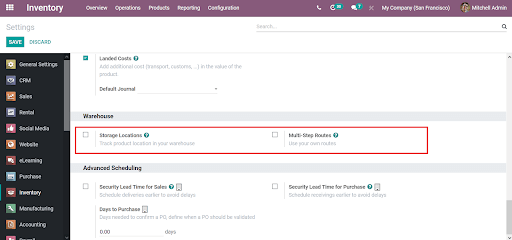
Product Tracking
The Odoo platform lets you define product lot numbers and serial numbers which will be one of the helpful tools in the aspects of product tracking as well as traceability of the products in the company warehouses. In addition, with the help of the definition of expiry date on each of the products along with the operations to assign them with the lots and serial numbers will benefit in the business with perishable goods. The traceability options are available in the settings menu of the inventory module. Here you can configure the options to run the traceability operation. Furthermore, you can enable the option to configure expiration dates on the products.
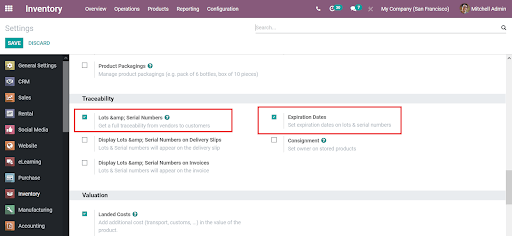
Route and Rules
In Odoo the product moves are conducted based on the rules and the routes of operations that have been assigned. Their rules and routes of the product move operations are customizable and can be defined based on your inventory operational needs. Moreover, these rules can be defined for the aspects of product procurement, product movement, sales operations, and inventory adjustments, and inhouse operations of the company regarding the movement of the products. Furthermore, you can configure the routes for the product moves in the Odoo platform using the Routes menu available in the inventory module. Here the routes of the product move along with the rules of the product movement within the warehouse can also be assigned for each of the routes.
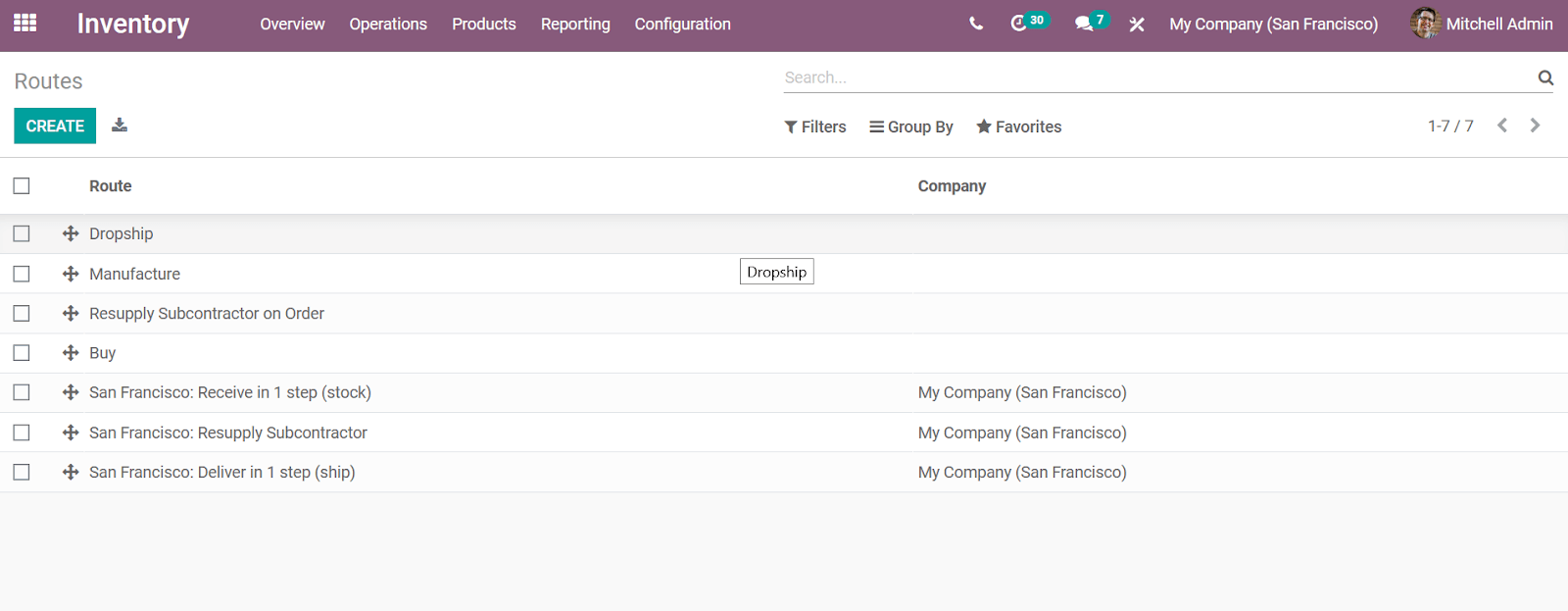
Sales management
Odoo has a dedicated sales operations management module which will be one of the beneficial and effective tools of sales operation management for any business. In the case of the secondary sales operations of your company, all the sale order, invoice operations can be efficiently conducted and well managed with Odoo. The following image shows the sales module dashboard from where you can navigate to the various sales management options available.
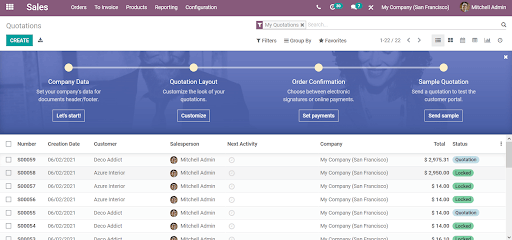
Invoicing and accepting payments
With the accounting modules of the Odoo, you can manage the finance operations of the company. The invoice operations management along with the function of generation of invoices can be automated with Odoo once the sales order is confirmed. Similar aspects can also be configured with the vendor bill payment operations. In addition, in Odoo you can define various payments acquired for accepting online as well as card payments this will add up to the aspects of the localization of the platform. Since it will allow you to define various region-based payment acquirers and terms of operation. In addition, from the accounting module, you can run the finance management positions such as invoicing, accepting payment, and sending money to vendors, and many more. The following image depicts the dashboard of the accounting module.
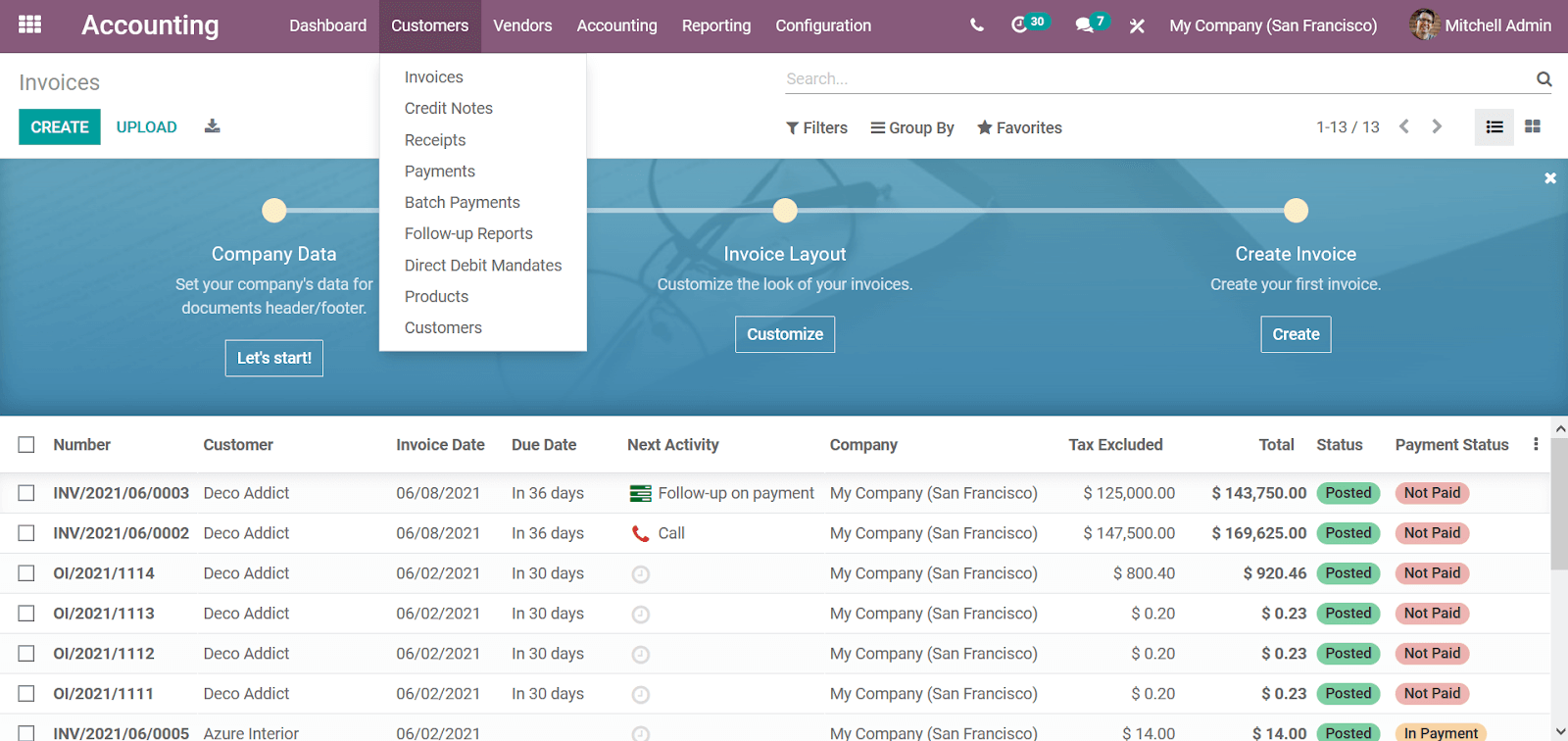
With Odoo you can effectively manage the secondary sales operations of a company and the distribution chain of a product.If you are looking for any Odoo related service you can contact us by dropping a mail at info@cybrosys.com